CSR Books & Publications
The Oxford-Achilles Working Group recommends the following readings on CSR and sustainable supply chains. If you would like to suggest a title for inclusion here, please send us an email: hazel.fry@sbs.ox.ac.uk
The Oxford-Achilles Working Group recommends the following readings on CSR and sustainable supply chains. If you would like to suggest a title for inclusion here, please send us an email: hazel.fry@sbs.ox.ac.uk
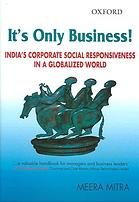
In this well-informed and grounded book, Meera Mitra brings to bear both theoretical and hands on consultancy experience across the development and private sectors – to track the evolution of CSR in India, especially in the post-reforms era. This is a subject rife with questions of political economy, of the interaction of government and business in development, and of the role of NGOs in moulding these processes. Using illustrations and cases, Mitra examines the efforts of the Indian corporate sector in this context. Recent issues such as the cola-pesticide controversy, the toxic waste dumping and the reservation of jobs in the private sector are all touched upon to highlight the challenges today’s businesses face and the latter’s response as well.
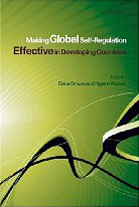
As companies 'go global' they increasingly use factories and facilities spread across the world. But who regulates their activities in far flung corners of the world economy? In many sectors such as textiles and apparel, chemicals, and forestry, the answer is that companies regulate their own behaviour through codes and standards which they agree among themselves. The recent growth in corporate self-regulation of labour, environmental and financial practices has attracted the attention of scholars who have detailed the number and content of self-regulatory efforts in various sectors. Missing so far, however, has been an analysis of the effectiveness and impact of self-regulation. Does self-regulation actually work and under what conditions is it most likely to be effective? The answer to this question is particularly important for developing countries where corporate self-regulation is often seen as substitute for weak governance structures. The chapters in this volume evaluate the effectiveness of self-regulation compared to other forms of global regulation. Across sectors and states, corporate self-regulation works best when those who are regulated have a voice in deciding the content of codes and standards and when some mechanism of compliance exists at the level of the state. Unfortunately, opportunities for voice and state capacity for regulation are often lacking in developing countries. Given this, the book suggests some minimal forms of government action and participation by global actors that can make global corporate self-regulation more effective in bettering conditions in the developing world.
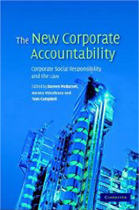
The adoption by companies of Corporate Social Responsibility (CSR) policies is routinely characterised as voluntary. But if CSR is self-governance by business, it is self-governance that has received a firm push from external social and market forces, from forces of social accountability. Law is also playing a more significant role than the image of CSR suggests, and this legal accountability - the focus of the book - is set to increase. Legal intervention should not, however, be seen as making social accountability redundant. Wider ethical standards and social and market forces are also necessary to make legal regulation effective. Law is being brought into play in innovative and indirect ways. The initiative lies as much with private organizations as with the state. At the same time governments are using social and market forces to foster CSR. In the context of corporate social responsibility, a new, multi-faceted, corporate accountability is emerging.

Governments spend huge amounts of money buying goods and services from the private sector. How far should their spending power be affected by social policy? Arguments against the practice are often made by economists - on the grounds of inefficiency - and lawyers - on the grounds of free competition and international economic law. Buying Social Justice analyses how governments in developed and developing countries use their contracting power in order to advance social equality and reduce discrimination, and argues that this approach is an entirely legitimate, and efficient means of achieving social justice.
The book looks at the different experiences of a range of countries, including the UK, the USA and South Africa. It also examines the impact of international and regional regulation of the international economy, and questions the extent to which the issue of procurement policy be regulated at the national, European or international levels. The role of EC and WTO law in mediating the tensions between the economic function of procurement and the social uses of procurement is discussed, and the outcomes of controversies concerning the legitimacy of the integration of social values into procurement are analysed. Buying Social Justice argues that European and international legal regulation of procurement has become an important means of accentuating the positive and eliminating the negative in both the social and economic uses of procurement.
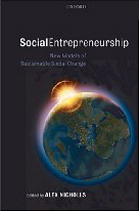
'Social Entrepreneurship' is a term that has come to be applied to the activities of grass-roots activists, NGOs, policy makers, international institutions, and corporations, amongst others, which address a range of social issues in innovative and creative ways.
Themed around the emerging agendas for developing new, sustainable models of social sector excellence and systemic impact, Social Entrepreneurship offers, for the first time, a wide-ranging, internationally-focused selection of cutting-edge work from leading academics, policy makers, and practitioners. Together they seek to clarify some of the ambiguity around this term, describe a range of social entrepreneurship projects, and establish a clear set of frameworks with which to understand it.
Included in the volume are contributions from Muhammad Yunus, the father of microfinance, Geoff Mulgan, former head of the British prime minister's policy unit, and Bill Drayton, founder of the Ashoka network of social entrepreneurs. Jeff Skoll, founder of the Skoll Foundation, and first president of eBay, provides a preface.
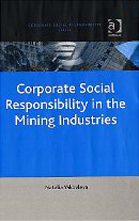
Based on the concept of corporate social responsibility, this book analyses modern approaches adopted by mining companies that could minimise negative impacts of mining and enhance positive benefits to corporate stakeholders. Using a case study of two mining sectors (gold and diamond mining) the book evaluates policies and practices of mining companies within four key areas of corporate social responsibility: environmental protection, health and safety, employee relations and community development. Also included is an assessment of three models for community development that are developed within the mining industries: company-led approach, establishment of corporate foundation and tri-sector partnership. The study analyses management of corporate social responsibility issues with specific reference to mining in the Russian Federation and provides a comparison with global mining companies.

The topic of corporate legal responsibility is deconstructed into many multifaceted components in this handbook, which systematically examines each in turn and describes the contemporary legal position.
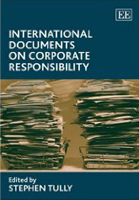
The social expectations of corporations within a globalised economic environment is challenging our traditional conception of the proper commercial function. This text delimits their emergent roles and responsibilities under international law.
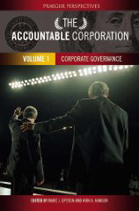
A landmark collection of essays on the role of business in society. In recent years, issues of business ethics, social responsibility, and accountability have been at the forefront of corporate, policymaking, and public concerns. Dramatic stories of abuse of stakeholder trust and outright criminal behaviour at companies like Enron, Global Crossing, and Tyco have triggered a re-examination of the role of corporations in society and the responsibilities of executives and managers, board members, and the accountants who are supposed to watch over them. This landmark set of essays brings new clarity to the issues, as societies around the world begin to hold corporations and their leaders to higher standards of conduct. Covering a huge array of topics - from white collar crime to community partnerships, whistle blowing to corporate philanthropy - and featuring insights from the world's leading academics, business leaders, and consultants, including strategy guru Michael Porter, Enron whistleblower Sherron Watkins, and famed international corporate attorney, Ira Milllstein, "The Accountable Corporation" provides provocative analysis, cultural and historical context, and emerging solutions from the public, private, and non-profit sectors toward more responsible, ethical, and accountable business. It features articles by the world's leading scholars, executives, practitioners, policymakers, and consultants. It addresses timely issues such as corporate scandals, whistleblowing, executive pay, and corporate "conscience" and provides international coverage.

Illustrated with profiles of dozens of major companies, the book enables readers to easily distinguish between true and false corporate responsibility, and uncovers a groundbreaking process for achieving total corporate health. Which one of these companies is the better corporate citizen? Wal-Mart, which, in response to multiple lawsuits and complaints that it treats workers unfairly, waged a multi-million dollar 2004 advertising campaign that countered accusations and characterized the basis of its bad publicity as "urban legend," or Gap, which, after spending years at the top of anti-sweatshop activist lists for its role in perpetuating unfair labor conditions overseas, released a candid 2004 CSR report that acknowledged that the company made mistakes and pledged to more constructively address labour issues in the future. In "The High-Purpose Company", corporate strategist and researcher Christine Arena shows that some extraordinary companies are driven by purpose, whereas others simply pretend to be. "The High-Purpose Company" draws a clear line in the sand, enabling readers to easily distinguish between these two groups and make a giant leap forward. Using a groundbreaking methodology, Arena and her research team conducted thousands of hours of analysis on the corporate social responsibility (CSR) practices of 75 well-known firms. The surprising results of the study defy long-held myths, rewrite rules, reframe strategic priorities, and reveal a new breed of business. Real CSR is about change, not charity. "The High-Purpose Company" uncovers this and other truths, and guides readers through the step-by-step process that is currently embraced by the world's most forward-thinking firms.
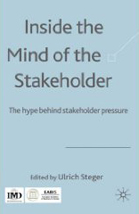
Illustrated with profiles of dozens of major companies, the book enables readers to easily distinguish between true and false corporate responsibility, and uncovers a groundbreaking process for achieving total corporate health. Which one of these companies is the better corporate citizen? Wal-Mart, which, in response to multiple lawsuits and complaints that it treats workers unfairly, waged a multi-million dollar 2004 advertising campaign that countered accusations and characterized the basis of its bad publicity as "urban legend," or Gap, which, after spending years at the top of anti-sweatshop activist lists for its role in perpetuating unfair labor conditions overseas, released a candid 2004 CSR report that acknowledged that the company made mistakes and pledged to more constructively address labour issues in the future. In "The High-Purpose Company", corporate strategist and researcher Christine Arena shows that some extraordinary companies are driven by purpose, whereas others simply pretend to be. "The High-Purpose Company" draws a clear line in the sand, enabling readers to easily distinguish between these two groups and make a giant leap forward. Using a groundbreaking methodology, Arena and her research team conducted thousands of hours of analysis on the corporate social responsibility (CSR) practices of 75 well-known firms. The surprising results of the study defy long-held myths, rewrite rules, reframe strategic priorities, and reveal a new breed of business. Real CSR is about change, not charity. "The High-Purpose Company" uncovers this and other truths, and guides readers through the step-by-step process that is currently embraced by the world's most forward-thinking firms.
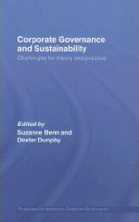
As sustainability poses new and major challenges for the theory and practice of corporate governance, this book, ideal for postgraduate students of business and management, identifies and addresses these challenges.